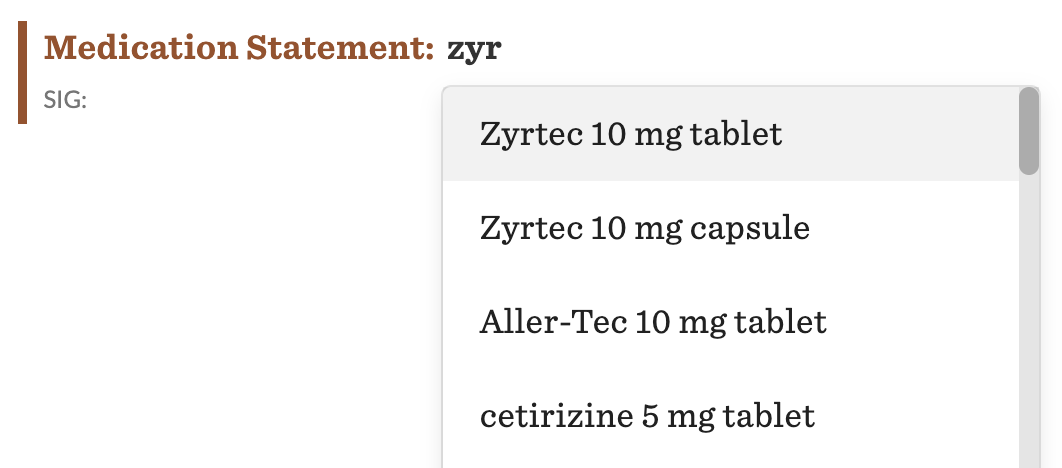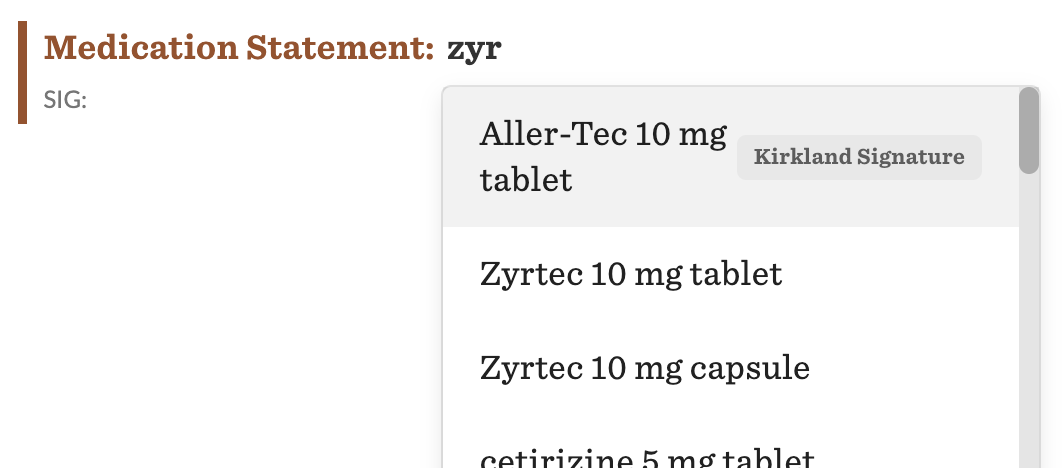Customize Search Results
In a typical visit note, it’s common for clinicians to make 20, 30, even 50 or more selections from structured terminologies with commands like Diagnose, Prescribe, Family History, and many more. You can help clinicians make faster and more accurate selections with Canvas plugins. Write simple plugin code to apply custom filtering, sorting, and search result annotations in real time with near zero latency.
This search modification can help clinicians:
- Choose the most appropriate medication that is also covered by insurance
- Prioritize in-network specialists
- Consider appropriate risk adjustment factors when selecting diagnosis codes
Canvas supports modifying search results in all refactored commands.
First, we’ll show you a complete example of customizing the search results for choosing a medication in a Medication Statement command, then we’ll break it down piece by piece so you can adapt the example to your own needs.
The Complete Example #
This example checks for the presence of a particular medication in the search results and, if present, annotates that medication option with additional information and adjusts its position to the top of the search results.
For reference, here’s the difference in behavior with the plugin inactive vs active:
Inactive (normal behavior):

Active (modified behavior):

Here’s the code in its entirety:
import json
from canvas_sdk.events import EventType
from canvas_sdk.effects import Effect, EffectType
from canvas_sdk.protocols import BaseProtocol
class Protocol(BaseProtocol):
RESPONDS_TO = EventType.Name(EventType.MEDICATION_STATEMENT__MEDICATION__POST_SEARCH)
def compute(self):
results = self.context.get("results")
if results is None:
return [Effect(type=EffectType.AUTOCOMPLETE_SEARCH_RESULTS, payload=json.dumps(None))]
post_processed_results = []
for result in results:
should_float_to_top = False
for coding in result.get("extra", {}).get("coding", []):
if (
coding.get("code") == 554704
and coding.get("system") == "http://www.fdbhealth.com/"
):
if result.get("annotations") is None:
result["annotations"] = []
result["annotations"].append("Kirkland Signature")
should_float_to_top = True
if should_float_to_top:
post_processed_results.insert(0, result)
else:
post_processed_results.append(result)
return [
Effect(
type=EffectType.AUTOCOMPLETE_SEARCH_RESULTS,
payload=json.dumps(post_processed_results),
)
]
Anatomy of the Example #
This code can be broken down into the following sections:
- Register interest in the correct search event
- Decide whether to make any changes
- Loop through the results, making modifications as appropriate
- Return the modified results as a properly typed effect
Register interest in the correct search event #
class Protocol(BaseProtocol):
RESPONDS_TO = EventType.Name(EventType.MEDICATION_STATEMENT__MEDICATION__POST_SEARCH)
def compute(self):
results = self.context.get("results")
The class inherits from BaseProtocol, which clues the plugin-runner into registering your code as interested in the event or events listed in the RESPONDS_TO class constant. We only specify one event here, MEDICATION_STATEMENT__MEDICATION__POST_SEARCH, but you could make this value a list to fire on multiple events. The event we’ve chosen to listen for can be read backwards to understand when it fires. This event is emitted after (“post”) the normal search results are found for the medication autocomplete field of the medication statement command. This event comes with a context that contains the search results that would be served to the user if there were no modifications.
Decide whether to make any changes #
if results is None:
return [Effect(type=EffectType.AUTOCOMPLETE_SEARCH_RESULTS, payload=json.dumps(None))]
If the value of the results is None, we bail out early. There is a subtle difference between results of None and an empty result set ([]). Results being None means “make no changes, present the results without modification”, whereas an empty result set means “present no options to the user”.
Loop through the results, making modifications as appropriate #
post_processed_results = []
for result in results:
should_float_to_top = False
for coding in result.get("extra", {}).get("coding", []):
if (
coding.get("code") == 554704
and coding.get("system") == "http://www.fdbhealth.com/"
):
if result.get("annotations") is None:
result["annotations"] = []
result["annotations"].append("Kirkland Signature")
should_float_to_top = True
if should_float_to_top:
post_processed_results.insert(0, result)
else:
post_processed_results.append(result)
In this block of code, we create a new list named post_processed_results to hold our modified result set. We then loop through each result in the unmodified results set, and check to see if the current medication result matches our chosen criteria (FDB code 554704).
If it does match, we first check to see if any annotations already exist and initialize the annotations list if needed. We then append our chosen annotation to the result’s annotation list and flag it as needing to be floated to the top (we had defaulted it to not be floated earlier on).
Finally, we add the result to our parallel list, post_processed_results. If it matched and was marked as being floated to the top, we insert it into the list at position 0. If it did not match, we append the result to the end of the list.
Return the modified results as a properly typed effect #
return [
Effect(
type=EffectType.AUTOCOMPLETE_SEARCH_RESULTS,
payload=json.dumps(post_processed_results),
)
]
With our list of modified results in place, we just need to return an effect of type AUTOCOMPLETE_SEARCH_RESULTS with our modified list as the payload.
The dropdown of options presented to the user now reflects our modifications!
Understanding Search Result Data Structures #
The search results in this example follow the MedicationSearchResult structure. Each result contains fields like text, disabled, description, annotations, extra, and value that provide detailed information about the medication option.
For complete details about medication search result data contracts and other search result structures, see the Search Result Data Structures section in the Events documentation.
Watch Me Build It #